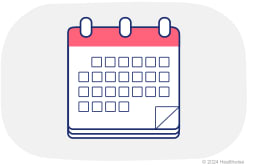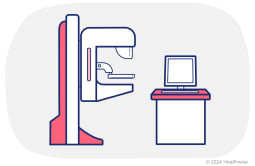Breast cancer happens when cells that are not normal grow in one or both of your breasts. Screening tests can help find some cancers that are too small to feel or before they cause symptoms. Breast cancer may be easier to treat if it's found early.

Ask your doctor about your risk for breast cancer. You can also go to www.cancer.gov/bcrisktool to find out.

Age is one factor that affects your risk for breast cancer. The risk goes up as you get older.
How is breast cancer screening done?
Mammogram. This is the most common test used to screen for breast cancer. It uses X-rays. Two types are a digital mammogram (DM) and a 3D mammogram.
Clinical breast exam. Talk to your doctor about whether to have this exam. Your doctor checks your breasts and under your arms for lumps or other changes.
MRI (magnetic resonance imaging) of the breast. An MRI may be used if you have a high risk of breast cancer. You may have a standard MRI or a “fast” MRI.
When should you get screened?

Experts don’t agree on when to start screening and how often to screen. Decide this with your doctor. Also decide with your doctor when to stop screening.

If you are at average risk, you can start screening sometime between ages 40 and 50. Have a mammogram every 1 or 2 years.
What are the risks of screening?
Breast cancer screening has some possible risks. Your doctor can help you compare the benefits to the risks.
Screening may lead to more tests. After a mammogram, some people need more tests to make sure they don’t have breast cancer. This is more common in younger people. Most of the time, the results of these extra tests are normal.
Screening may find cancer that won’t hurt you. Doctors can't always tell which cancer will be life-threatening. You could have cancer treatment that you may not need.
Sometimes screening tests miss cancer that is there. This could delay treatment.
Mammograms expose you to a very small amount of radiation. For most people, the benefits of mammograms far outweigh the low risk from radiation.
Current as of: October 25, 2024
Author: Ignite Healthwise, LLC Staff
Clinical Review Board
All Ignite Healthwise, LLC education is reviewed by a team that includes physicians, nurses, advanced practitioners, registered dieticians, and other healthcare professionals.

